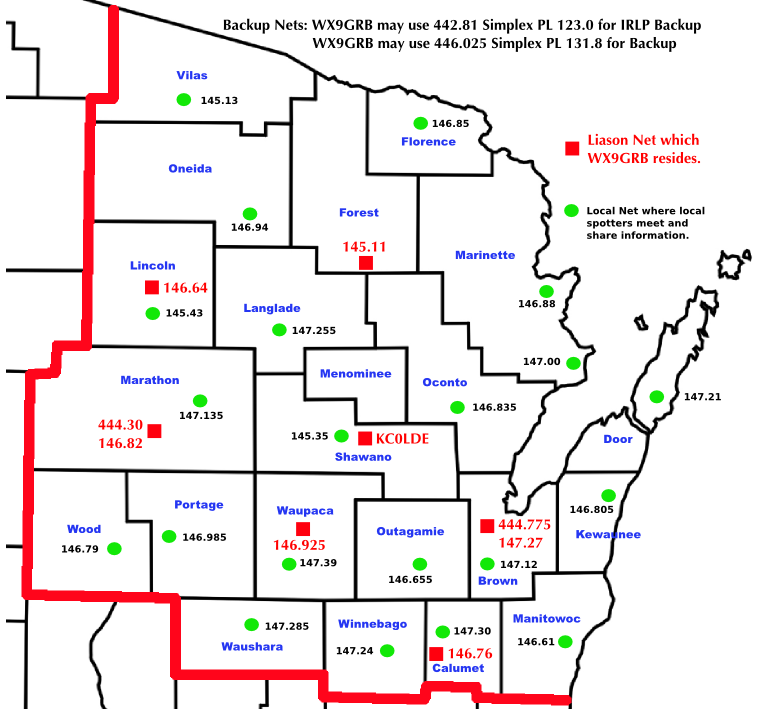NE Wisconsin Amateur Radio Local Nets
While advancements in technology (such as the NEXRAD Doppler Radar) have helped weather forecasters alert the public, the WFO GRB greatly appreciates the efforts of local storm spotters to report in real-time weather conditions that meet the criteria. The radar does not see everything -- there is a "radar horizon" that the radar cannot see below... so while it may detect a funnel cloud, it may not "see" that it touched the ground to form a tornado. Only the diligent eyes of the safety-minded trained spotter can verify current local weather conditions, and get them into the WFO for processing.
PASS does not have, nor do we desire, any authority over a local net. For every activation, we request that a dedicated, non-NCS, non local-spotting relay station who has sufficient radio and antenna capabilities to work both nets, and provide the necessary communications to each party. In other words, the relay station's sole duty is to move traffic between WX9GRB and the local net.
Shown below is a map of NE Wisconsin, and the known nets were Skywarn operations take place:

Local Nets need to take a measure of responsibility for their actions, both before a weather event, and during a weather event. Every morning, members of local nets should check the forecast and the Hazardous Weather Outlook, to see if activation is likely. They can also check out NOAA Weather Radio in the morning to receive updates on the weather situation. Do not let the weather surprise you.
During Active weather events, PASS requires the following:
1) Provide a Liaison (Relay) Station to the PASS Net. This individual should be trained to handle traffic moving from both nets, and ideally, is not going to be the same person who is the NCS of the Local Net, nor should a Relay be a Local Spotter. This person, once checked into the PASS Net, needs to remain on frequency so that WX9GRB can contact your county in a timely fashion.
2) Report Severe Criteria reports as soon as possible. Please do not batch reports together for the end of the storm. Please report severe criteria situations as soon as possible. Your report could trigger a Warning that saves lives. When making your report, identify yourself with your county name, and say a one-word description of the report, such as "Brown County, Hail".
3) Please do not report non-criteria items. Your report of information that has no value to the WFO GRB could prevent other more critical items from being received. For example, reporting that sirens are going off in a city provides us no value. A siren will not threaten personal life and property.
4) Please keep spotter safety in mind. PASS will never ask someone to enter a risky situation, and we ask that Local Nets do the same. An injured / deceased spotter would be a horrible loss! Please keep safety as your #1 priority, so that you can spot again with us another day!
Since PASS does not administer local nets, we cannot list local standards and procedures. Please contact the local group that you would like to work with for more information.